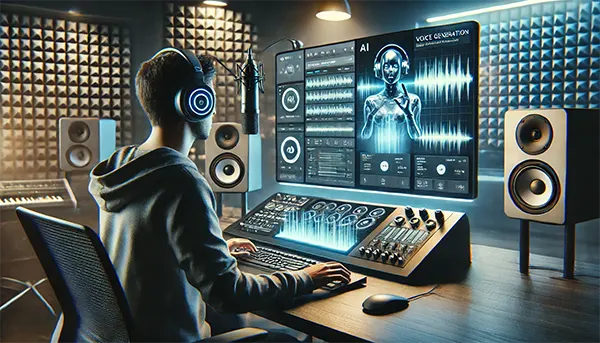
Selling Your Voice Online: How to Make Money with AI Voice Dubbing and Voiceover Services
As artificial intelligence continues to transform digital industries, voice cloning and AI-generated voiceovers have become highly profitable opportunities. Whether you want to sell your natural voice or use AI to generate synthetic voices, there are multiple ways to monetise this skill. This article explores how to train AI on your voice, find voiceover gigs, and leverage synthetic voice tools for passive income.
Training AI with Your Own Voice and Selling It for Voiceovers
AI voice cloning enables individuals to replicate their voices and sell them for various applications, such as audiobooks, advertisements, and video narration. The process begins with high-quality voice recordings and training AI models to generate realistic voice replications.
To start, record your voice using professional-grade software like Adobe Audition or Audacity. AI voice platforms like Resemble AI, Descript, and ElevenLabs require a dataset of recorded phrases to generate a synthetic voice model. The more data you provide, the more natural the AI-generated voice will sound.
Once your AI-generated voice is ready, you can monetise it by licensing it to businesses and content creators. Many companies require AI voiceovers for e-learning courses, automated call systems, and even digital assistants. Marketplaces like Voice123 and Voquent provide access to these clients, allowing you to sell voice usage rights on a per-project or subscription basis.
Where to Find Voiceover Jobs: Best Platforms and Marketplaces
Freelance voice actors and AI voice creators can find work through specialised voiceover marketplaces. Websites such as Voices.com and Bunny Studio offer thousands of job listings where businesses seek professional narrators.
Additionally, platforms like Fiverr and Upwork allow freelancers to offer voiceover services, catering to clients needing custom narrations for podcasts, YouTube videos, and mobile apps. Many successful freelancers build a strong portfolio and set competitive rates to attract regular clients.
For those using AI-generated voices, selling pre-recorded scripts or licensing AI-generated audio clips can be a lucrative business model. Companies often seek ready-to-use voice files for automated systems, reducing the need for live recordings.
Monetising Voice Recordings for TikTok, YouTube, and Podcasts
Short-form video platforms like TikTok and YouTube Shorts have created a demand for unique voiceovers. Content creators constantly seek new voices to enhance their videos, and AI voice synthesis allows voice artists to scale their offerings.
You can create AI-generated voice packs for TikTok creators, selling custom voice effects or pre-recorded narrations. Many influencers use these voice packs for branding, ensuring their content remains distinctive.
Podcasting is another profitable area for voice artists. Many podcasters require professional narrations for intros, ads, and episode transitions. By offering high-quality recordings, voiceover artists can build long-term client relationships with podcast creators.
Best AI Tools for Voice Cloning and Automation
Several AI platforms have emerged that help automate voice cloning and voiceover production. Some of the most popular tools include:
– Resemble AI – Offers custom AI-generated voice models with real-time editing features.
– Murf AI – Provides professional-quality voiceovers for videos and e-learning projects.
– Speechelo – Converts text into natural-sounding AI-generated speech.
– Play.ht – Generates high-quality voiceovers from text with emotional tones.
These tools allow users to automate voiceover creation, saving time and effort while ensuring consistent quality.

Potential Earnings and Real Case Studies
The earning potential in the voiceover industry depends on skill level, niche, and platform choice. Beginner voice artists on Fiverr can charge between £30-£100 per project, while professionals on Voices.com may earn £200-£500 per voiceover.
One case study is a freelancer who built an AI voice model and licensed it to content creators. Through passive income from AI-generated voice clips, they earned over £3,000 per month. Another success story includes a YouTuber who created a unique AI voice pack and sold it to other creators, generating over £10,000 within six months.
By leveraging AI voice technology, individuals can create multiple revenue streams, from direct voiceover gigs to automated income through AI-generated content licensing.
Final Thoughts: The Future of AI Voice Commerce
The market for AI-generated voices continues to grow, offering opportunities for voice artists, content creators, and entrepreneurs. Whether using your natural voice or an AI-generated one, monetising voiceovers can provide substantial income with minimal ongoing effort.
As AI tools advance, voice actors will have more ways to automate their work and expand their earning potential. By adopting the latest technology and building a strong personal brand, anyone can turn voiceover services into a successful online business.
